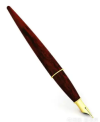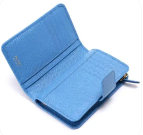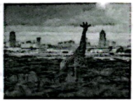山东省临沂市2025年中考英语真题
试卷更新日期:2025-07-29 类型:中考真卷
一、阅读理解(共20小题;每小题1.5分,计30分)
-
1. 阅读下列短文,根据短文内容,选择最佳答案。
LOST!

Lost: My pen
Last seen: In Room 2216 on Monday afternoon.
Description: Long, thin, pointy, black ink, with my name on the body.
Contact: Bill, 896-4523.
Thank you!
Thank you!
Thank you!

Please help me find my blue wallet! Contact Gina at 268-5893. $10 reward!
REWARD!
REWARD!
LOST PET

Male, two years old, teddy. Last seen on November 23rd, in the area of Main Street. Please call Linda at 825-1145 if you find him! $20 reward!
Have You Seen This Mug

My yellow and white mug was lost at Creative Services kitchen on Friday morning. If found, please wash and return to Creative Services kitchen, or call Jason at 555-6896. Thank you!
Mug, if you can read this, please come home! I miss you!
(1)、Where was the pen last seen?A、In Room 2216. B、In the area of Main Street. C、In Creative Services kitchen.(2)、What was lost on November 23rd?A、A pen. B、A wallet. C、A pet.(3)、Why does Jason say "please come home"?A、Because Jason loves the mug. B、Because the mug is very expensive. C、Because Jason wants to wash the mug.(4)、What is the main purpose of these notices?A、To tell people some interesting stories. B、To help the owners find their lost things. C、To show people how to write lost-and-found notices.2. 阅读下列短文,根据短文内容,选择最佳答案。Have you ever heard of a foreign teacher from Bristol, UK? He is working very hard to achieve his Chinese dream. His name is James. He has been a teacher at Hunan University of Arts and Science for eight years. His students love him and call him a "legendary" foreign teacher.
Since he was a little child, he felt like he had a feeling of friendship with China. Now, he spends a lot of time doing charity (慈善) work. And he has always worked wholeheartedly for the people. He cares about the veterans (退伍军人) who fought in the War of Resistance Against Japanese Aggression (1931–1945). He has been volunteering at a local aid center in Changde, Hunan province for those veterans for over six years. He often travels to many small villages to visit the veterans with other volunteers. "Charity is our duty," says James. "We shouldn't forget these veterans. Everyone should care for them."
James also helps poor students by supporting their education. He believes every student should have a chance to learn. Because of his effort, in September 2014, James won Hunan's Seventh Xiaoxiang Friendship Award (奖). This award is given to foreigners who help make Hunan a better place by the People's Government of Hunan province.
Now James is trying to get a Chinese green card. He wants to stay in China forever. "Some people think being successful means having enough money," he says. "But my dream is to help more people in need." He hopes to become part of Chinese society and take real action to achieve his Chinese dream step by step.
(1)、How long has James been a teacher in China?A、For over six years. B、For eight years. C、Since he was a child.(2)、What does Paragraph 2 mainly tell us?A、James' effort for the veterans. B、James' love for traveling in China. C、James' experience of learning Chinese history.(3)、Why did James win the Xiaoxiang Friendship Award?A、For his Chinese learning well. B、For his charity work in Hunan province. C、For his wonderful teaching skills in Hunan province.(4)、What's the main idea of this passage?A、James' travel experiences in China. B、James' teaching experiences in China. C、James' Chinese dream of helping others.3. 阅读下列短文,根据短文内容,选择最佳答案。The Taklimakan Desert is the largest desert in China. It is about 337,600 square kilometers in the Tarim Basin in Xinjiang. The dry environment makes it difficult for life there. Sandstorms often happen, and the moving sand seriously influences the lives of local people and the natural environment in this area. However, the Chinese government and people have been making much effort to control the desert. Here are some of scientific and effective ways they have used.
One of the main ways is to build a tree belt (带) around the desert. By the end of 2023, a 2,761-kilometer-long green belt had already been built around it. In 2024, the last part of the belt, 285 kilometers, was finished. It's about 3,046 kilometers in total. The belt lies as a strong wall against the spread of the desert.
Biological ways are also widely used. For example, people grow special plants that can grow well with little water, like huyang, suosuo, shabang and so on. These plants hold the sand and reduce sandstorms. At the same time, they can also bring certain economic (经济的) benefits to local people.
And the method of using solar power generation (太阳能发电) has been used too. By building greenhouses, people can grow vegetables and fruits. In this way, they can make full use of the land and light in the desert area.
Great changes have already taken place. The natural environment around the desert has been improved greatly. The local economy has also been developed rapidly. The success in the control of this desert shows: as long as we have a strong will and use scientific methods, we can protect the environment and build a better future for both people and nature.
(1)、How does the writer start the passage?A、 By listing facts. B、By giving examples. C、By answering questions.(2)、What does the underlined word "effective" probably mean in Paragraph 1?A、Expensive. B、Simple. C、Useful.(3)、Why do people grow special plants in the desert?A、To make the desert more beautiful. B、To prevent sandstorms and get economic benefits. C、To provide food for animals and make more money.(4)、Which of the following best shows the structure of the passage? (P= Paragraph)A、 B、
B、 C、
C、 4. 阅读下列短文,根据短文内容,选择最佳答案。
4. 阅读下列短文,根据短文内容,选择最佳答案。
Nowadays, there are many great inventions around us. They make our lives better in amazing ways. One of them is called "Tianmouc"—the world's first smart chip (芯片) that works like our eyes and brains. A team from Tsinghua University made it!
Tianmouc gets an idea by how our human eyes and brains work together. First, our eyes see things around us. Then, our brains understand them. Tianmouc does something similar! It uses special sensors (传感器) to break down what it sees into tiny parts. Then, Tianmouc puts them together in two ways. One is by seeing colors and details clearly as if we read a book. The other is by reacting (回应) to sudden changes quickly, just like we catch a ball.
Tianmouc is really powerful. It can do things that traditional chips can't. For example, it's able to collect what it sees at a very high speed of 10,000 frames (帧) per second. In some ways, it sees things more exactly than our eyes. The chip can work well in different light conditions—no matter how bright or dark the light is. All of these are achieved with very little power or energy.
Tianmouc has a big influence on our daily life. For self-driving cars, they need to "see" the road clearly and react quickly to any danger. Tianmouc can notice sudden changes quickly, like a child running across the road or a car suddenly cutting in. For the cameras, they will react faster by catching any unusual movement in the future.
Inventions like Tianmouc show how creative the humans can be! They are making our lives more convenient and safer. Who knows what amazing inventions we'll see next?
(1)、What do we know about "Tianmouc"?A、It's a new type of cameras that can react faster. B、It's a special sensor for self-driving cars to see and react quickly. C、It's the world's first smart chip working like human eyes and brains.(2)、From Paragraph 2, we know ____.A、how Tianmouc works B、how Tianmouc helps us C、what makes Tianmouc special(3)、What does the writer mean by asking "Who knows what amazing inventions we'll see next?"?A、The writer doubts if there will be new inventions. B、The writer believes more amazing inventions will appear. C、The writer thinks inventions will mainly make cars faster.(4)、Where is the passage probably from?A、A travel ad. B、A health guide. C、A science magazine.5. 阅读下面短文,根据短文内容,从下列选项中选出能填入文中空白处的最佳选项。选项中有一项为多余选项。
Last summer, I took an exciting trip to Nairobi National Park. It's just 7 kilometers away from the city center. What makes the park special? As soon as I arrived there, the warm African sun kissed my face, and the loud roar (咆哮) of a lion reached my ears. I couldn't wait to start.
The park is huge, covering about 117 square kilometers. Electric fences (围墙) keep the park separate from the city on three sides-east, west, and north. But the south side keeps open, letting animals move freely as the seasons change. The park has been there for over 70 years. There are 80 kinds of mammals (哺乳动物) and more than 500 kinds of birds in the park. But here's an important rule—they must stay inside their cars. Why? Because there are big, dangerous animals like lions and leopards walking around!
It's unbelievable that we can not see elephants in the park. So there might not be enough food for the other animals. Also, they could be a danger to people living nearby. However, in the park, there is a meaningful Ivory Burning Monument (象牙焚烧纪念碑). It's said that Kenya's president burned 2.5 tons of ivory here to show the government's strong will against ivory trade in 1989. And the monument was built to remind people of this famous history event. Today many visitors from all over the world and Kenyan students go there.
And we all share the same home—the earth. We should care for our animal friends and protect our planet.
A. One reason is that elephants eat tons of plants for food.
B. It's the only wildlife park inside a capital city around the world!
C. Every year, millions of visitors come to see these wonderful animals.
D. Many visitors can walk anywhere in the park to see the animals freely.
E. After this experience of travelling, I know humans and animals are friends.
二、语言运用(共20小题;每小题1分,计20分)
-
6. 阅读下面短文,根据短文内容从方框中选出恰当的单词或短语填空,使语意通顺完整。第一个方框供小题选用,第二个方框小题选用。每个选项只能使用一次,每框有一项剩余。
A. So B. something wrong C. relationship D. drove E. myself F. Even though
It was a grey Saturday afternoon. I sat in my room, staring at so much homework I hadn't finished. As a student, the pressure of the coming exams was always making me feel upset. Also, the with my parents was getting worse.
My parents, especially mom, always peeked (窥视) into my room every few minutes, saying "Attention to your books!" or "Why can't you be like other good students?" Her words me crazy, and she didn't care about my feelings at all. I tried to tell her I did need space to relax, we always ended up arguing loudly. It felt like a big wall standing between us.
One evening, after another big fight, I locked in my room, feeling really angry. Just then, dad knocked softly and came in. He sat down and said gently, "I know you've had a hard time lately. Mom and I only want the best for you, but maybe we've done ." His words surprised me.
7. 阅读下面短文,根据短文内容从方框中选出恰当的单词或短语填空,使语意通顺完整。A. with the help of B. take pride in C. what D. clearly E. own F. how
Then, dad told me about his school days—how he fought against pressure and didn't understand his parents either. He suggested we should communicate well with each other. I told my parents their behaviors made me nervous. To my joy, they listened carefully and said sorry to me, because they hadn't thought about my feelings before. At the same time, I understood that they everything good that I do. Finally, I made a new study plan my parents.
From then on, my parents started to understand me better, and I learned to express my thoughts . The "wall" between us disappeared slowly. And I realized that proper communication is the key to solving problems. This is a very important lesson that I'll remember forever.
8. 阅读下面短文,在空白处填入一个适当的单词或括号内单词的正确形式。"Everyone says Yimeng Mountain is beautiful, the scenery on Yimeng Mountain is excellent ..." When this well-known melody (旋律) plays, the green mountains and clear water of Yimeng come alive in the music. For over 70 years, the story behind this local song has remained unknown widely. Let's search for (it) past and present together.
Song Shoulian, the third-generation inheritor (第三代传唱人) of the tune, told reporters that the song (create) in the 1940s, carrying the simple and hard-working spirit of Yimeng. "In 1940, Ruan Ruoshan and Li Lin were from the First Anti-Japanese University were asked to create a song to praise Yimeng people. They collected materials by (visit) local families and researching folk culture. Thanks their long-term preparations, Ruan Ruoshan wrote the lyrics with Li Lin in a village house overnight. When Ruan Ruoshan sang the song for the first time, the crowd was excited that many people volunteered to join the army," said Song. Later, it spread across Shandong and other places.
With the simple lyrics, beautiful melody, and (live) performances, Yimeng Mountain Tune has become a symbol of Yimeng and a musical sign of Shandong. (protect) this culture, the Yimeng Mountain Tune Living Museum was built at the tune's birthplaceBaishiwu, Feixian in 2016. The museum shows the tune's history completely. It (hold) plenty of wonderful performances so far. "We organize many regular singing activities, especially for (child), to pass the tune down generation after generation." Song said.
三、阅读表达(共5小题;每小题2分,计10分)
-
9. 阅读下面短文,完成短文后的问题。
The history of traffic lights dates back to the early 19th century in Britain. London was a busy city with horse-drawn carriages (马车). They often rushed into people, causing many accidents. At the same time, there was a fashion rule in London—women in red showed that they were married and green for unmarried. This gave people the idea for using red and green as traffic signs later.
On December 10th, 1868, British mechanic (机械师) De Hart designed the world's first traffic light with only red and green. A policeman had to pull a belt to change the lights: red meant "stop", and green meant "go". At first, it worked well and reduced accidents. However, this traffic light exploded (爆炸) after 23 days. The light was turned off, but the idea stayed alive.
In 1914, electric traffic lights were first used in America. Red and green still did their jobs, then they were safer and easier to see.
In 1927, a Chinese student named Hu Ruding was studying in the US. He noticed drivers sometimes rushed when the light changed. "What if there's a middle color to slow people down?" he thought. That's how the yellow light was born, meaning "get ready to stop." Around the same time, an American policeman named William Potts created the first three-color traffic lights for all directions. They made crossroads much safer.
These colors were not chosen by chance. Red is easy to see, like a fire alarm, so it means "danger-stop!" Yellow is a warning, like a sign that says "be careful—slow down!" Green, like a forest, tells us "safe to go!" Together, they form a common language that keeps safe every day.
Great ideas come from everyday things. Whether traffic lights or something else, noticing and thinking "what if" can change the world!
(1)、When did the world's first traffic light with only red and green appear?(2)、Who suggested adding a yellow light to traffic signs?(3)、What does the underlined word "they" refer to in Paragraph 5?(4)、What's the title for the passage?(5)、According to the writer's opinion, what should we do?四、补全对话(共4小题;4小题2分,其它每小题1分,计5分)
-
10. 阅读下面对话,在每个空白处填入一个适当的句子,使对话完整,合乎情境。
(Teng Fei and Sarah meet in front of the library on Saturday afternoon.)
Teng Fei: Hey Sarah! I called you an hour ago, but you didn't answer.
Sarah: I'm sorry. I left my phone at home.
Teng Fei: Never mind. ?
Sarah: I was reading Treasure Island at that time.
Teng Fei: ?
Sarah: It's about a boy who goes out to sea and finds an island full of treasures.
Teng Fei: Wow! Sounds cool!
Sarah: Oh, Teng Fei! Why did you call me?
Teng Fei: My cousin Binbin from Shanghai is going to be here tomorrow.
Sarah: Oh, Binbin. I remember we went bike riding together last fall.
Teng Fei: Yes, that's right. ?
Sarah: Sorry, I can't have a picnic with you tomorrow. I have to study for a math test next Monday.
Teng Fei: That's OK. Maybe next time! By the way, the summer vacation is coming, what are you going to do next?
Sarah: . It's good for my Chinese study.
Teng Fei: That's a good idea. That might really help!
Sarah: Thank you!
五、书面表达(计15分)
-
11. 某英文网站正在开展以 "体质健康提升" 为主题的征文活动。请你以"How I Improve My Physical Health"为题,用英语写一篇短文投稿,谈谈你在体质健康提升方面的做法和理由。
提示:1. What kind of exercise do you usually do?
2. How do you do exercise?
3. What else can help you to improve your physical health? Give your reasons.
要求:1.词数不少于80,开头已经写好,不计入总词数;
2.语言通顺,条理清楚,书写规范;
3.文中不要出现任何真实人名、校名及其他相关信息,否则不予评分。
How I Improve My Physical Health
Nowadays, people pay much more attention to physical health. For me,
-
-